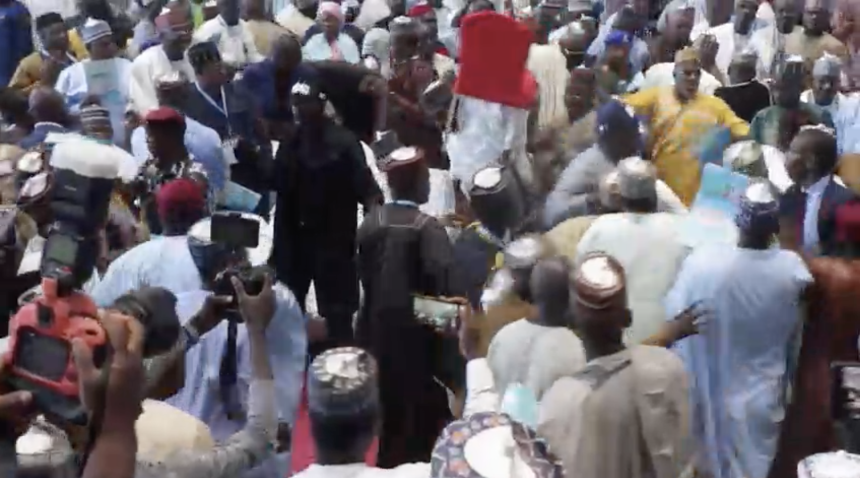The All Progressives Congress (APC) zonal stakeholders’ meeting in Gombe State, intended as a platform for unity and strategic planning, erupted into chaos following a perceived disrespect towards Vice-President Kashim Shettima. The gathering, attended by prominent party figures including national leaders, ministers, governors, and lawmakers, quickly devolved into a tense standoff after Mustapha Salihu, the APC’s National Vice Chairman (North-East), publicly endorsed President Bola Ahmed Tinubu for a second term without acknowledging Shettima, himself a significant political figure from the North-East. This omission ignited outrage amongst party loyalists, who viewed it as a deliberate slight against their region and its representation within the ruling party. The resulting uproar saw security personnel intervening to escort Salihu from the venue as tempers flared and verbal altercations threatened to turn physical.
The incident highlighted the underlying tensions and fierce loyalty battles brewing within the APC as the 2027 general elections draw closer. The North-East region, historically a powerful political bloc in Nigeria, is particularly sensitive to issues of representation and recognition at the national level. Shettima’s position as Vice-President is a symbol of this regional influence, and any perceived disregard for his office is interpreted as a challenge to the North-East’s political standing. Salihu’s oversight, whether intentional or not, ignited these existing sensitivities, exposing the deep-seated anxieties and rivalries within the party. The speed and intensity of the reaction underscored the high stakes involved as various factions within the APC begin positioning themselves for future power plays.
Attempts to quell the unrest and restore order to the meeting proved challenging. Alhaji Bukar Dalori, the Deputy National Chairman (North), addressed the agitated delegates and offered a joint endorsement of both Tinubu and Shettima for a second term. This conciliatory gesture, while aimed at calming the situation, failed to fully assuage the aggrieved party members. The atmosphere remained charged, reflecting the depth of the perceived insult, and Dalori himself ultimately required security escort from the venue. The incident served as a stark reminder of the fragile equilibrium within the party and the potential for even minor perceived slights to escalate into major confrontations.
Despite the disruptive episode, Yobe State Governor Mai Buni sought to refocus the meeting on its original purpose: assessing the party’s achievements, addressing challenges, and strategizing for the future. He emphasized the North-East’s historical significance in Nigerian politics, citing prominent figures like the first and only Prime Minister, Sir Abubakar Tafawa Balewa, and other influential leaders who hailed from the region. Buni connected this rich political legacy to the present, highlighting the current contributions of North-Eastern figures like Vice-President Shettima and National Security Adviser Nuhu Ribadu. He urged attendees to cherish and uphold this legacy, emphasizing the importance of supporting the APC-led government at both the national and state levels to ensure continued success and strengthen the party’s position in Nigeria’s political landscape.
Governor Buni’s address also offered a broader perspective on the APC’s decade-long reign as Nigeria’s ruling party and Africa’s largest political entity. He attributed the party’s enduring power to strategic planning, focused leadership, and a commitment to inclusivity. He stressed the importance of unity and internal cohesion, urging the party faithful to resolve internal disputes, prioritize the needs of supporters, and strengthen the party’s reward system. This appeal for unity resonated against the backdrop of the earlier upheaval, serving as a reminder of the potential consequences of internal divisions and the need for a cohesive strategy moving forward. Buni’s remarks emphasized the continued relevance of the meeting’s original objectives despite the unexpected disruption.
The incident at the Gombe State APC stakeholders’ meeting offers a revealing glimpse into the complex internal dynamics of the ruling party. While Governor Buni sought to steer the narrative back towards unity, strategic planning, and the party’s achievements, the eruption of anger over the perceived slight against Vice-President Shettima exposed deep-seated sensitivities surrounding regional representation and loyalty. This incident serves as a potent reminder of the challenges facing the APC as it navigates the complex political landscape in the lead-up to the 2027 elections. Maintaining unity and managing internal rivalries will be crucial to the party’s ongoing success, and incidents like this underscore the delicate balancing act required to maintain internal cohesion and project a unified front.


